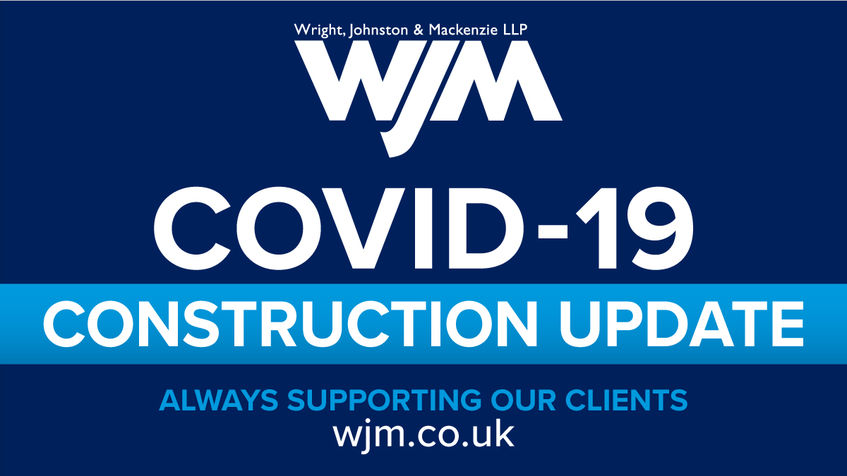Construction Post Covid-19

An update to this post can be found here: https://www.wjm.co.uk/news/construction-site-closure-guidance--and-the-law
With lockdown in the UK set to be extended, Roddy Cormack, legal director at Wright, Johnston & Mackenzie LLP, considers what the future may have in store for the construction industry.
Although no one knows exactly when lockdown will be lifted, it’s inevitable that the severe restrictions in place at present will end at some point, so what will that mean for the construction sector?
In terms of managing the health & safety risk to everyone affected by projects, including the general public, a lifting of the lockdown will not mean things will be allowed to go back to normal – at least not for a while.
It’s likely that construction operations will need to be carried out in a way which minimises the risks of spreading COVID-19.
The likelihood is that construction operations in Scotland will still need to be carried out in compliance with the guidelines issued by the Construction Scotland Innovation Centre (https://www.cs-ic.org/library/working-on-site-during-the-covid-19-pandemic-construction-guidance/).
Compliance with the guidelines will, at the very least, increase costs due to the implementation of additional measures such as handwashing facilities and environmental cleaning. Additional welfare accommodation space may also need to be hired to allow social distancing to be maintained on breaks and so on.
Additional time or additional resource will also likely need to be applied to projects to allow workers to perform certain activities in a safe manner. Such additions will result in an increase in costs.
It may be that certain activities can’t be carried out at all - something as simple as hanging a door, for example, may not be possible given the job usually requires two people to be in close proximity of each other.
There may be PPE solutions to certain problems, but there are several things to take into consideration. Firstly, where is the PPE going to come from, given the current shortages, and if you can get your hands on PPE, does that mean it’s been diverted from frontline key workers?
The cost of PPE will also need to be taken into consideration, along with the protocol and risk assessment for its use and disposal.
The next question, therefore, is who pays for these increased costs?
In pure contract terms, unless the increased costs are linked to an instructed variation, or unless it’s a cost plus contract, the likelihood is that such increases are to be borne by the contractor. Depending on what attendances they have agreed to provide to their sub-contractors, a main contractor may be able to expect those sub-contractors to absorb some of the costs.
If a contractor is facing crippling increased costs across all their current projects, it may well be that they will be eyeing the termination provisions within their contracts with interest. If a contractor can avoid increased and unpriced for prelim costs by bringing contracts to an end, such a route may be the only option other than going into insolvency.
Employers may, therefore, need to think beyond simply what the contract says before deciding whether or not they expect their contractors to pay increased costs if they want to see their projects completed within a reasonable timeframe.
Moreover, agreeing a revised price with an existing contractor may be a less painful exercise than trying to reach a deal with a completely new contractor at a later date.
Until we know what restrictions are going to continue, and for how long, it is going to be impossible to put actual figures against contracts.
It may, however, be sensible to use the current lull in operations as an opportunity to start discussions with your opposite numbers as to what can be agreed in the way of principles when it comes to works recommencing, and the associated costs.
If you would like to stress test potential options before having such discussions, our team of construction law experts is on hand to help.
The information contained in this newsletter is for general guidance only and represents our understanding of relevant law and practice as at April 2020. Wright, Johnston & Mackenzie LLP cannot be held responsible for any action taken or not taken in reliance upon the contents. Specific advice should be taken on any individual matter. Transmissions to or from our email system and calls to or from our offices may be monitored and/or recorded for regulatory purposes. Authorised and regulated by the Financial Conduct Authority. Registered office: 319 St Vincent Street, Glasgow, G2 5RZ. A limited liability partnership registered in Scotland, number SO 300336.



